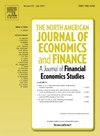Happiness and stock market participation
IF 3.9
3区 经济学
Q1 BUSINESS, FINANCE
North American Journal of Economics and Finance
Pub Date : 2025-06-18
DOI:10.1016/j.najef.2025.102491
引用次数: 0
Abstract
This study investigates the underexplored relationship between stock market participation and household happiness by analyzing microdata from the China Household Finance Survey (CHFS 2013, 2015, 2017). Our findings reveal a robust inverted U-shaped relationship between happiness and stock market participation, offering novel resolutions to three persistent puzzles in behavioral finance: the stock market participation puzzle, the happiness-income paradox, and the interplay between happiness and risk. Mechanism analysis further uncovers the multidimensional moderating role of risk through perceived risk, risk identification (social interaction, financial interest, and financial literacy), and background risk (urban–rural disparities and health status). The perceived risk significantly moderates the relationship between happiness and stock market participation. Risk identification factors operate distinctively with social interaction, amplify participation for moderately happy households, financial interest modulates participation nonlinearly, and financial literacy affects portfolio diversification. Background risks moderate the relationship between happiness and participation decisions and depth. These results provide critical empirical foundations for designing targeted financial policies that address heterogeneity in household risk dynamics and psychological well-being.
幸福感与股市参与度
本文通过分析《中国家庭金融调查》(CHFS 2013、2015、2017)的微观数据,探讨了股票市场参与与家庭幸福感之间的关系。我们的研究结果揭示了幸福感与股票市场参与之间的倒u型关系,为行为金融学中三个持续存在的难题提供了新的解决方案:股票市场参与之谜、幸福感-收入悖论以及幸福感与风险之间的相互作用。机制分析通过感知风险、风险识别(社会交往、金融利益和金融素养)和背景风险(城乡差距和健康状况)进一步揭示了风险的多维调节作用。感知风险显著调节了幸福感与股票市场参与之间的关系。风险识别因素对社会互动有显著影响,对中等幸福家庭的参与有放大作用,金融利益对参与有非线性调节作用,金融素养对投资组合多元化有影响。背景风险调节了幸福感与参与决策和深度之间的关系。这些结果为设计解决家庭风险动态和心理健康异质性的有针对性的金融政策提供了关键的实证基础。
本文章由计算机程序翻译,如有差异,请以英文原文为准。
求助全文
约1分钟内获得全文
求助全文
来源期刊
CiteScore
7.30
自引率
8.30%
发文量
168
期刊介绍:
The focus of the North-American Journal of Economics and Finance is on the economics of integration of goods, services, financial markets, at both regional and global levels with the role of economic policy in that process playing an important role. Both theoretical and empirical papers are welcome. Empirical and policy-related papers that rely on data and the experiences of countries outside North America are also welcome. Papers should offer concrete lessons about the ongoing process of globalization, or policy implications about how governments, domestic or international institutions, can improve the coordination of their activities. Empirical analysis should be capable of replication. Authors of accepted papers will be encouraged to supply data and computer programs.

 求助内容:
求助内容: 应助结果提醒方式:
应助结果提醒方式:


